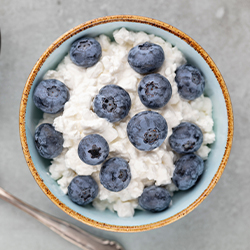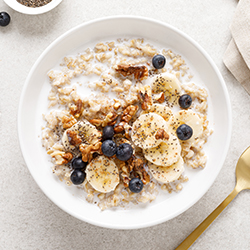
HOW DAIRY HELPS FUEL EARLY CHILDHOOD DEVELOPMENT DURING THE FIRST 1,000 DAYS
From the moment of conception to a toddler’s second birthday, nutrition has more impact than possibly any other time — it’s a period of foundational early childhood development and extraordinary growth.
During the first 1,000 days of life, babies and toddlers grow at lightning speed — that requires a lot of fuel. While most of us think of dairy as helping build strong bones, that’s only part of the picture. The truth is dairy contributes to healthy brains, bones, and bodies. It can help nourish moms during pregnancy and breastfeeding and fuel toddlers as they grow.
For parents and caregivers, the first 1,000 days are two formative years that can be both exciting and daunting. The nutritional choices you make during pregnancy, infancy, and toddlerhood, can be foundational for your little one’s health and wellbeing for a lifetime.
The nutritional benefits of dairy are science-backed and can help support a child’s development during the first two years. It starts with nourishing mom during pregnancy and breastfeeding. Consuming dairy foods during pregnancy is linked to better infant growth and development thanks to the impressive amount of brain-building nutrients found in milk and dairy products. And then, dairy continues to provide essential nutrients for little ones when they can start enjoying solid foods and whole milk as toddlers.
From pregnancy to early childhood, dairy supports:
- Brain health – Dairy provides 7 of the 14 nutrients identified by the American Academy of Pediatrics as important for early brain development. It can nourish during pregnancy and breastfeeding, and when age appropriate for toddlers
- Growth and development – Yogurt provides nine essential nutrients and cheese provides eight essential nutrients, many of them key to child growth and development. For moms, eating nutrient-rich yogurt and cheese while pregnant helps support healthy brain development, and many children can start enjoying yogurt and cheese between 6–12 months. (Consult with your pediatrician to confirm if cheese and yogurt is right for your child)
- Bone health – When age appropriate, dairy foods provide more calcium, vitamin D, protein, and phosphorus than any other food group. Think of it as building a “bone bank” for the future: The more your child saves now, the stronger their foundation will be later
- Immunity – When age appropriate, the protein, vitamins A, B12, and D, zinc, and selenium found in dairy help build a strong defense system during a child’s earliest years
During the first 1,000 days, from zero to toddlerhood, muscles and bones are undergoing rapid growth, organs are maturing, and brains are making more than a million neural connections every second, laying the foundation for coordination, language, memory, and learning.
Nutrient deficiencies or imbalances during that time can have lasting effects such as stunting, cognitive delays, and poor academic performance. Nutrient-rich diets, on the other hand, especially those that include the protein, fat, and vitamins found in dairy, can set children up for a healthier future.
How dairy can support: Pregnancy

Even before babies are born, they’re helping themselves to what’s on mom’s plate.
During pregnancy, women need more calcium, vitamin D, iodine, and protein to support their growing baby. It’s important to find whole food, bioavailable sources of nutrients as well as taking a comprehensive prenatal vitamin if recommended by a medical professional.
A glass of milk, a few cheese cubes, or a bowl of yogurt can help moms meet their daily nutrient needs, especially during those initial weeks or months of pregnancy-associated nausea, also known as morning sickness. Dairy packs nutrition into small servings, making it easier for moms to get the fuel they need, even when their appetite is low.
Some of the most important nutrients during pregnancy include:
 Calcium
Calcium
Helps build strong teeth and bones, which begin forming at five weeks gestation, before most women even know they’re pregnant.
Percent daily value found in one 8-ounce serving of milk : 25%
 Iodine
Iodine
Iodine deficiency is the most preventable cause of intellectual disability in the world. Getting enough iodine in pregnancy supports the healthy development of a baby’s brain.
Percent daily value found in one 8-ounce serving of milk: 60%
 Protein
Protein
Essential for building every part of a baby — from their tiny features to the cells that make up their growing body. The complete protein in dairy supports the development and maturation of vital organs, particularly during the final stages of pregnancy.
Percent daily value found in one 8-ounce serving of milk: 16%
 Zinc
Zinc
Supports healthy cell growth, immune system function, and reduces the risk of low birthweight.
Percent daily value found in one 8-ounce serving of milk: 10%
 Vitamin D
Vitamin D
Aids in calcium absorption. Without adequate levels, babies can face weak bones, muscle problems, or other health concerns at birth.
Percent daily value found in one 8-ounce serving of milk: 15%
 Choline and folate
Choline and folate
Choline and folate are also critical to fetal health and early brain development. These nutrients are present in dairy products in modest amounts and, while not the primary source, can still play a supporting role in a balanced prenatal diet.
How dairy can support: Breastfeeding

Once babies are fully formed and out in the world, they still rely on mom for their nutrients. When possible, breast milk is recommended as babies’ sole source of nutrition from 0–6 months.
Breastfeeding delivers a custom-made blend of essential nutrients that support babies’ developing digestive tract and rapid growth. Their brains alone grow 1% every day for the first three months of life.
Good nutrition for moms means good nutrition for babies and dairy helps keep them both fully nourished. When it comes to the nutrient profile of breast milk, the good news is that regardless of mom’s nutritional intake, babies continue to get high-quality vitamins, minerals, antibodies, and more. The bad news? If a breastfeeding woman’s diet doesn’t replenish those lost nutrients, her body pays the price. So, it’s important for breastfeeding moms to ensure they’re getting enough nutrients — for their baby and themselves. And, a balanced diet is key to maintaining a healthy milk supply, which can lead to more successful breastfeeding outcomes.
August is National Breastfeeding Month, which aims to support women and babies to breastfeed as long as they wish.
If you’re looking to support a loved one’s breastfeeding journey this National Breastfeeding Month, there are many thoughtful ways you can help, including sharing the delicious taste and nutritional benefits of milk and dairy products
How to support a breastfeeding mom with dairy goodness:
- Stock her fridge with nourishing, dairy-rich foods like Greek yogurt with granola or cottage cheese with fruit, like single-serve cups from DFA farmer-owned brand, Kemps®
- Gift her smoothie packs made with whole milk
- Cook freezer-friendly meals with cheese or milk-based sauces, such as lasagna, enchiladas, or creamy soups
- Bring hydrating drinks like chocolate milk, kefir, or maybe even her favorite flavor of milkshake for quick energy and key nutrients like calcium, potassium, and vitamin B12
- Offer to hold the baby while she eats something nourishing, like a cheese-covered omelet or yogurt parfait
- Help by cleaning her kitchen, doing laundry, or tidying up so she can rest and focus on feeding her baby
- Create a snack-and-sip station with shelf-stable options like granola bars, and shelf-stable, dairy-based protein shakes, like DFA farmer-owned brand, Sport Shake®
How dairy can support: Starting solids
 When possible, breastfeeding is recommended for at least the first six months of your baby’s life, but once your little one hits around six months and starts showing signs they’re ready, you can introduce solid foods, including yogurt and cheese, should you wish — a big step for infant growth and development.
When possible, breastfeeding is recommended for at least the first six months of your baby’s life, but once your little one hits around six months and starts showing signs they’re ready, you can introduce solid foods, including yogurt and cheese, should you wish — a big step for infant growth and development.
This is also a crucial phase for early brain development, as babies begin sitting, standing, crawling, and walking, so exposing your baby’s palate to a variety of nutrient-rich foods is important.
After your baby’s first birthday, you can start to serve pasteurized plain, whole milk, if approved by your pediatrician. In fact, most health authorities encourage drinking milk and water only from their first through their second birthday. Plant-based milk alternatives are not recommended as a complete replacement for real dairy milk. Not only do they lack the nutritional profile of milk, but they are often filled with preservatives, gums, and stabilizers.
Dairy foods, like whole milk, cheese, and yogurt are nutrient powerhouses that can help your baby grow strong and healthy. They’re nutrient dense and are loaded with calcium and phosphorus, which continue to help build baby’s maturing bones and teeth. It’s also packed with high-quality protein, which supports muscle growth and overall early childhood development.
Easy, dairy-forward meal ideas for toddlers:
- Cheese and veggie omelet
- Whole milk cottage cheese with pureed fruit
- Steamed veggies with shredded cheese
- Mashed or blended potatoes with butter
- Yogurt and avocado mash
Introducing dairy expands a growing child’s diet while continuing to deliver some of the rich nutrients they’ve been getting from breast milk. Plus, the healthy fats in dairy are crucial for brain growth during these early years. Of course, every baby is unique, so check with a pediatrician about when and how to start including dairy and for personalized advice about what to watch for when introducing potentially allergenic foods.
For more information, check out this feeding guide for the first two years.
Nourishing your child’s first milestones with dairy
Through every stage of a child’s first two years, dairy provides high-quality nutrition that is affordable and accessible. Milk and dairy products are generally less expensive than items like processed snacks and sugary drinks. The nutrition provided per serving makes dairy an even more impactful purchase for families.
It can be overwhelming to know that a child’s future health is so heavily reliant on their caregivers. Thankfully, with access to dairy products and endless ways to serve them, children can get the healthiest start possible.
How our Cooperative builds healthy futures

As a farmer-owned cooperative, we at Dairy Farmers of America (DFA) are proud to produce high-quality, nutrient-dense milk and dairy products that can help provide a healthy start for families around the world from day one to 1,000 — and beyond.
From putting milk on store shelves to helping stock food pantries, we’re committed to providing the nutrition of real dairy to families everywhere.
When you purchase dairy products from our farmer-owned brands, you choose to nourish your little one with the very best. By starting healthy habits early, your child has a head start to a healthier future.
Learn more about DFA’s commitment to hunger relief and nutrition access through our DFA Cares Foundation.